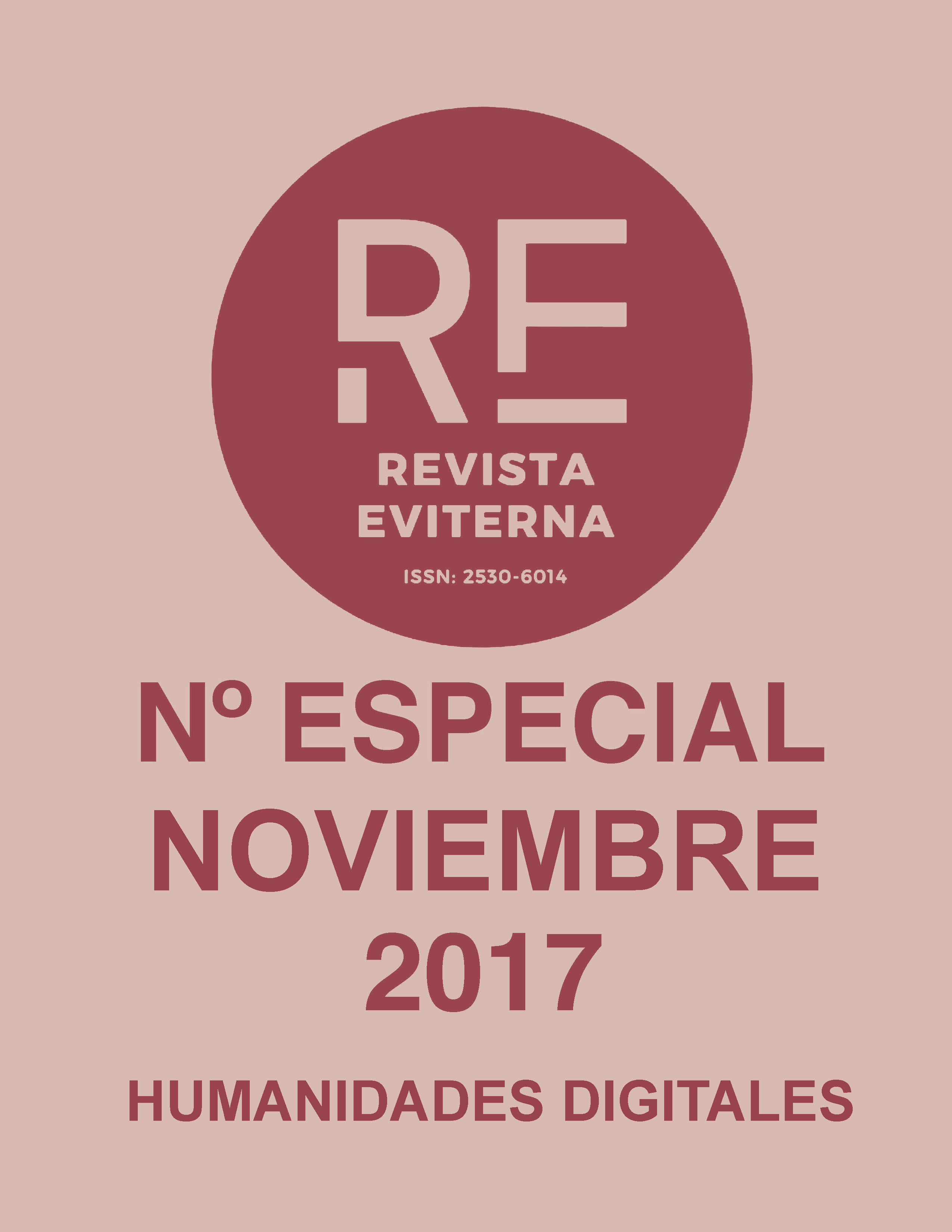Del pensamiento conceptual al pensamiento mágico. Nociones sobre el estatuto de la práctica teórica en la cultura_ram
DOI:
https://doi.org/10.24310/Eviternare.v0i0.8401Palabras clave:
intelección, modalidad, pensamiento, práctica, imaginaciónResumen
El presente artículo aborda los efectos del cambio del régimen escópico dominante sobre el desarrollo de la práctica teórica. Al respecto, problematiza acerca del surgimiento del aparato digital y la cultura_RAM. En esta última, toda información se produce mediante simulacros digitales distribuidos como imágenes-tiempo a lo largo del entramado-link. De esa manera, prima la imaginación codificada a través del programa cibernético por sobre la crítica teórica. Tal modalidad operatoria exige un modelo particular de intelección que rechaza al pensamiento conceptual moderno - propio de las ciencias –, sustituyéndolo por el pensamiento mágico. Aquel, totaliza las apariencias de lo vehiculado en red, rechazando todo giro reflexivo que atente contra la temporalidad acelerada de la realidad virtual. Así, nos encontramos ante un proceso de precarización de la práctica teórica que tiene sus causales en la materialidad misma del aparato digital. Por efecto de esta nueva modalidad informática de la materia, lo imaginario se impone sobre lo conceptual, reforzando las posiciones de la ideología dominante gobernadora de lo visible. La hegemonía de lo imaginario en el seno de la cultura_RAM implica que el pensamiento mágico relegue al pensamiento conceptual, menoscabando el estatuto de la práctica teórica contemporánea.
Descargas
Métricas
Publicación Facts
Perfil de revisores N/D
Información adicional autores
Indexado: {$indexList}
-
Indexado en
- Sociedad Académica/Grupo
- N/D
- Editora:
- Universidad de Málaga
Citas
ALTHUSSER, Louis (2015a). Iniciación a la Filosofía para los No Filósofos. Editorial Paidós SAICF: Buenos Aires.
- (2015b). “La Reproducción de las Relaciones de Producción”. En Althusser, Louis. Sobre la Reproducción. Ediciones Akal, S. A., Madrid, pp.31-245.
AUGE, Marc. Los <>.Espacios del Anonimato. Una Antropología de la Sobremodernidad. Editorial Gedisa, S.A.: Barcelona.
BAUDRILLARD, Jean (1976). La Génesis Ideológica de las Necesidades. Editorial Anagrama: Barcelona.
- (2001). “La Precesión de los Simulacros”. En Brian Walles (ed). Arte Después de laModernidad. Nuevos Planteamientos en Torno a la Representación. Ediciones Akal, S.A, Madrid, pp. 253-281.
- (2008). El Pacto de Lucidez o la Inteligencia del Mal. Amorrortu: BuenosAires.
BENJAMIN, Walter (1989). “Pequeña Historia de la Fotografía”. En Benjamin, Walter. Discursos Interrumpidos I. Filosofía del Arte y de la Historia. Taurus S.A., Buenos Aires, pp. 61-83.
BELTING, Hans (2007). Antropología de la Imagen. Katz Editores: Buenos Aires.
BREA, José Luís (2007). Cultura_RAM. Mutaciones de laCultura en la Era de su Distribución Electrónica. Gedisa S.A.:Barcelona.
- (2010). Las Tres Eras de la Imagen. Imagen-Materia, Film, E-Image. Ediciones Akal, S.A.: Madrid.
COMERON, Octavio (2007). Arte y Postfordismo. Notas desde la Fábrica Transparente. Trama Editorial y Fundación Arte y Derecho: Madrid.
CATALÁ, Josep M. (2010). La Imagen Interfaz. Representación Audiovisual en la Era de la Complejidad. Servicio Editorial de la Universidad del País Vasco: Bilbao.
DÉOTTE, Jean-Louis (2012). ¿Qué es un Aparato Estético? Benjamin, Lyotard, Rancière.Ediciones/ Metales Pesados: Santiago de Chile.
- (2013). La Época de los Aparatos. Adriana Hidalgo Editora S.A.: Buenos Aires.
FLUSSER, Vilém (2001). Una Filosofía de la Fotografía. Editorial Síntesis S.A.:Madrid.
HERNÁNDEZ-NAVARRO, Miguel (2016). “El Archivo Escotómico de la Modernidad”, Revista NOiMAGEN, número 1, Santiago de Chile, pp. 1-59.
LACAN, Jacques (2009). “Más Allá del <>”. En Lacan, Jacques. Escritos 1. Siglo XXI Editores, S.A., México D.F., pp. 81-89.
SPINOZA, Baruch (2011). Ética Demostrada Según el Orden Geométrico.Alianza Editorial, S.A.: Madrid.
VIRILIO, Paul (1996). El Arte del Motor. Aceleración y Realidad Virtual. Ediciones Manantial: Buenos Aires.
Descargas
Publicado
Cómo citar
Número
Sección
Licencia
Todos los contenidos publicados en Revista Eviterna están sujetos a la licencia Creative Commons Reconocimento-NoComercia-Compartirigual 4.0 cuyo texto completo puede consultar en <http://creativecommons.org/licenses/by-nc-sa/4.0>

Se pueden copiar, usar, difundir, transmitir y exponer públicamente, siempre que:
- Se cite la autoría y la fuente original de su publicación (revista, editorial y URL de la obra).
- No se usen para fines comerciales.
- Se mencione la existencia y especificaciones de esta licencia de uso.
Los derechos de autor son de dos clases: derechos morales y derechos patrimoniales. Los derechos morales son prerrogativas perpetuas, irrenunciables, intransferibles, inalienables, inembargables e imprescriptibles.
De acuerdo con la legislación de derechos de autor, Revista Eviterna reconoce y respeta el derecho moral de los autores/as, así como la titularidad del derecho patrimonial, el cual será cedido a la Universidad de Málaga para su difusión en acceso abierto.
Los derechos patrimoniales, se refieren a los beneficios que se obtienen por el uso o divulgación de las obras. Revista Eviterna se publica en open access y queda autorizada en exclusiva para realizar u autorizar por cualquier medio el uso, distribución, divulgación, reproducción, adaptación, traducción o transformación de la obra.
Es responsabilidad de los autores/as obtener los permisos necesarios de las imágenes que están sujetas a derechos de autor.







12.png)



